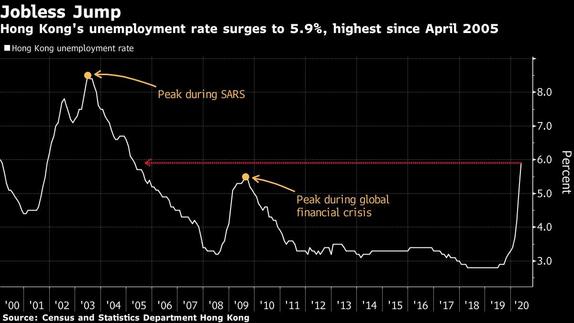
Hong Kong’s unemployment rate rose to the highest level in 15 years in May, in the wake of the coronavirus shutdowns and renewed anti-government protests.
The jobless rate rose to 5.9 percent for the March-to-May period while the underemployment rate climbed to 3.5 percent, the highest in almost 17 years, according to a government release.
READ MORE: ‘Basic jobs’ needed to help the unemployed
While the local epidemic situation has abated, it will take time for local economic activities to return to normal.
Law Chi-kwong, Hong Kong Secretary for Labour and Welfare
Unemployment in the city is the worst since April 2005, when Hong Kong was recovering from the SARS virus outbreak. It tops the post-financial crisis peak of 5.5 percent in August 2009, the data show.
“While the local epidemic situation has abated, it will take time for local economic activities to return to normal,” said Hong Kong Secretary for Labour and Welfare Law Chi-kwong in the government report. “The external environment also remains difficult as the pandemic continues to weigh on the global economy.”
The labor market will face pressure in the near term but the pace of deterioration may slow, Law said.
Year-on-year declines in total employment and the labor force widened to 6.5 percent and 3.3 percent respectively, both the biggest on record, the government said. The number of unemployed people has increased by more than 100,000 since December, to about 230,000.
ALSO READ: HK unemployment rate rises to highest since 2009
Comparing March-May with February-April, the unemployment rate increased across almost all the major economic sectors, while the increases of underemployment rate were mainly seen in the sectors of retail, transportation, and warehousing and support activities for transportation.
Unemployment in consumption and tourism-related industries climbed to 10.6 percent, the highest since October 2003 in the wake of the SARS crisis while underemployment in the sector hit a record 6.3 percent. Joblessness in the food and beverage sector worsened to 14.8 percent. Conditions in most other industries also weakened, especially in construction.
To preserve the vitality of the economy, the HKSAR government has rolled out relief measures of unprecedented scale, including a series of measures on job retention and job creation, Law said. "These measures should help keep workers in employment. The government will monitor the situation closely."


